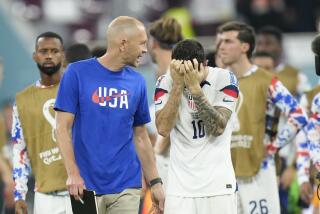U.S. Victory Clinches Dubler Cup : American Team Melts Down the Opposition on Hardcourt
- Share via
American tennis got some good news Sunday, though not without a touch of irony.
The U.S. team’s 3-0 victory over West Germany to clinch the Dubler Cup was, on the surface, a nice one for the nation’s tennis ego. It wasn’t Wimbledon they were playing at Lindborg Racquet Club in Huntington Beach, and it wasn’t John McEnroe beating Boris Becker. It was, on the other hand, a nice reminder of the dominance American tennis once wielded--and still does in the 45-and-over, Davis Cup-styled seniors event.
But a look at the U.S. roster revealed that three of the four U.S. players were born abroad: Keith Diepraam in South Africa, Rob Cadwallader in Australia and Adrian Bey in Zimbabwe. Thay Butchee was the only U.S.-born player on the U.S. team.
“I don’t see any problem with that,” said Diepraam, ranked No. 1 in the U.S in 45-and-over singles.
“I was born in South Africa, but I’m an American citizen. So is Adrian. Rob still has an Australian passport, but he’s lived here for years. We’re all Americans, whether or not we were born here.”
The melting-pot team had little trouble against the West Germans. In singles, Cadwallader defeated Klaus Fuhrmann, 6-3, 6-4, and Diepraam defeated Bodo Nitsche, 6-3, 7-5. Because the U.S. already had clinched the championship, neither of its top two men played doubles. But the team of Bey/Butchee won anyway, 7-6, 6-2, over Klaus Haas/Gunter Krauss.
“This is a good West German team,” Cadwallader said. “But this is our surface. We’re used to playing on the hardcourts and they’re not. It’s a different game. And I guarantee you, the outcome would have been different if we had played on clay.”
The fast concrete played right into the U.S. team’s hands.
In the first singles match, Cadwallader beat Fuhrmann with a serve-and-volley game that had the West German running from net to baseline. It was obvious that the movement was tiring Fuhrmann. Cadwallader’s bigger serve gave him an edge, but he scored most of his points on lobs. After forcing Fuhrmann to the net, he invariably would launch a lob that would bounce near the baseline, while Fuhrmann struggled, but usually failed, to get back.
“If I had to point to the weakest part of my game, it would be the lob,” Cadwallader said. “But today, it probably won the match for me. It’s hard to explain. My timing was good.”
So was Diepraam’s.
Diepraam did a good job of baiting Nitsche. Just when Nitsche expected a baseline shot, he would score down the line or on a crossing shot.
“The ball got a little fluffy and slowed down a bit early in the second set,” Diepraam said. “When that happened, he started coming to the net, and that played into my hands.”
When it came to match point in the second set, Diepraam ended it the way he won most of his points. With Nitsche at the opposite side, Diepraam hit a cross-court shot that bounced on the line and beyond Nitsche’s grasp.
“When it hits on the line away like that, you can’t do much with it,” Nitsche said. “A perfect shot. It was a good match, though. A fast-paced game, more than I am used to. I played as good as I can play. But he is good, very good, very mobile.”


